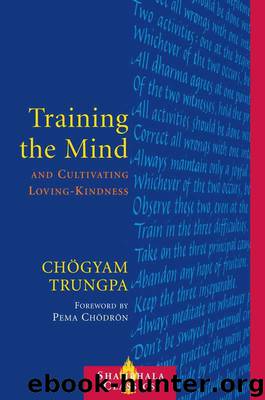Training the Mind and Cultivating Loving-Kindness by Trungpa Chogyam

Author:Trungpa, Chogyam [Trungpa, Chogyam]
Language: eng
Format: azw3
Publisher: Shambhala Publications
Published: 2010-09-28T03:00:00+00:00
Number four is asking the dharmapalas, or “protectors of the teachings,” to help you in your practice. This is not quite the same as praying to your patron saint, asking him to make sure you can cross the river safely. Let me just give you a very ordinary, basic idea of this. You have your root guru, your teacher, who guides you and blesses you, so that you could become a worthy student. At a lower level, you have protectors of the teachings, who will push you back to your discipline if you stray into any problems. They are sort of like shepherds: if one sheep decides to run away, the shepherd drives it back into the corral. You know that if you stray, the protectors will teach you how to come back. They will give you all sorts of messages. For instance, when you are in the middle of a tremendous fit of anger and aggression and you have become a cormpletely nondharmic person, you might slam the door and catch your finger in it. That teaches you something. It is the principle of corraling you back to the world where you belong. If you have the slightest temptation to step out of the dharmic world, the protectors will herd you back—hurl you back—to that world. That is the meaning of asking the dharmapalas, or the protectors, to help you in your practice.
The dharmapalas represent our basic awareness, which is not so much absorbed in the meditative state of being but which takes place or takes care of us during the postmeditation experience. That is why traditionally we have chanting taking place toward the end of the day, it is time to go to sleep or eat dinner, and when it is time to wake up in the morning. The idea is that from morning to evening, our life is controlled or secured purely by practice and learning all the time. So our life is sacred.
Toward the end of our day, quite possibly we have possibilities of taking a break from sacred activity and meditative activity. At that time, quite possibly all kinds of neurosis beyond measure could attack us. So that is the most dangerous time. The darkness is connected with evil in some sense, not as the Christian concept of Satan, particularly, but evil as some kind of hidden neurosis which might be indulged and which thereby might create obstacles to realization. Moreover, our practice of meditation may be relaxed—so in order not to create a complete break from sitting practice or discipline, in order to continue, we ask these protectors of the dharma to work with us. They are no more than ourselves. They are our expression of intelligence or of mind, which happens constantly. And their particular job is to destroy any kind of violence or confusion which takes place in us.
Usually confusion is connected with aggression a great deal. It is adharma or antidharma. Dharma does not have a sense of aggression; it is just simple truth.
Download
This site does not store any files on its server. We only index and link to content provided by other sites. Please contact the content providers to delete copyright contents if any and email us, we'll remove relevant links or contents immediately.
The Way of Zen by Alan W. Watts(6600)
Ego Is the Enemy by Ryan Holiday(5413)
The Art of Happiness by The Dalai Lama(4125)
The Book of Joy by Dalai Lama(3972)
Why Buddhism is True by Robert Wright(3446)
Spark Joy by Marie Kondo(3298)
Shift into Freedom by Loch Kelly(3192)
Happiness by Matthieu Ricard(3040)
A Monk's Guide to a Clean House and Mind by Shoukei Matsumoto(2902)
The Lost Art of Good Conversation by Sakyong Mipham(2647)
The Meaning of the Library by unknow(2564)
The Unfettered Mind: Writings from a Zen Master to a Master Swordsman by Takuan Soho(2304)
The Third Eye by T. Lobsang Rampa(2257)
Anthology by T J(2206)
Red Shambhala by Andrei Znamenski(2193)
The Diamond Cutter by Geshe Michael Roach(2058)
Thoughts Without A Thinker: Psychotherapy from a Buddhist Perspective by Epstein Mark(2011)
Twilight of Idols and Anti-Christ by Friedrich Nietzsche(1890)
Advice Not Given by Mark Epstein(1878)
